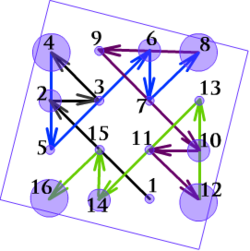Primitive Modular Quadratics. Part I
 Let
:
⎩
⎪
⎨
⎪
⎧
f
(
x
)
=
x
2
−
6
x
−
1
6
g
(
x
)
=
f
(
∣
x
∣
)
h
(
x
)
=
∣
g
(
x
)
∣
Let
:
⎩
⎪
⎨
⎪
⎧
f
(
x
)
=
x
2
−
6
x
−
1
6
g
(
x
)
=
f
(
∣
x
∣
)
h
(
x
)
=
∣
g
(
x
)
∣
Find the sum of all real roots of the equation g ( x ) = 0 .
Author's Note : What you observe in the picture attached to this problem?
This section requires Javascript.
You are seeing this because something didn't load right. We suggest you, (a) try
refreshing the page, (b) enabling javascript if it is disabled on your browser and,
finally, (c)
loading the
non-javascript version of this page
. We're sorry about the hassle.
5 solutions
Simplest solution(+1)
Algebraically: g ( x ) = f ( ∣ x ∣ ) g ( x ) = ( ∣ x ∣ ) 2 − 6 ( ∣ x ∣ ) − 1 6 h ( x ) = ∣ g ( x ) ∣ h ( x ) = ∣ ( x 2 − 6 ∣ x ∣ − 1 6 ) ∣ h ( x ) = ∣ ( x 2 − 6 ∣ x ∣ − 1 6 ) ∣ = ∣ ( − x ) 2 − 6 ∣ − x ∣ − 1 6 ∣ = h ( − x ) S o , h ( a ) = h ( − a ) h ( a ) = 0 < = > h ( − a ) = 0 a − a = 0 Numerically: h ( − 8 ) = ∣ ( − 8 ) 2 − 6 ∣ − 8 ∣ − 1 6 ) ∣ = 0 h ( + 8 ) = ∣ ( 8 2 − 6 ∣ 8 ∣ − 1 6 ) ∣ = 0 8 − 8 = 0
@Sandeep Bhardwaj Sir, I solved the question correctly, but could you please tell me what to observe in the picture given??
See that roots of f(x) are of opp sign now when modulus function is applied function becomes summetric about y axis so if one root is a other definately be − a and only 2 roots exist so sum = 0
If α is a root then − α is also a root. Thus, sum will be 0